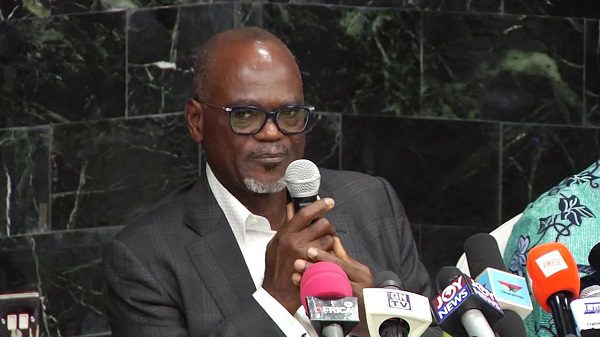Businessman, Dr Kofi Amoah has said the downgrade of Ghana’s economy by S&P credit rating agency, reflects the insufficiency of the internal policies and economic decision of the managers of the local economy.
He raised concerns about the poor performance of the Cedi against the dollar, increasing rate of inflation and also the overreliance on import.
Regarding import specifically, he said the inordinate taste for bringing goods into the country from other lands is creating jobs for other people in their countries thereby, denying Ghanaians access to productive jobs in their homeland.
Dr Kofi Amoah said these while speaking on the Business Focus programme with Paa Kwesi Asare on TV3 Monday August 8, while commenting on the downgrade of the economy by S&P.
S&P decided to push Ghana’s debt further into speculative territory, lowering its foreign and local currency sovereign ratings to CCC+/C from B-/B, on Friday August 5.
It said its outlook for the country is negative, “reflecting Ghana’s limited commercial financing options, and constrained external and fiscal buffers.”
The Covid-19 pandemic and the conflict in Russia have magnified Ghana’s fiscal and external imbalances, S&P said.
Demand for foreign currency has been driven higher by several factors, including nonresident outflows from domestic government bond markets, dividend payments to foreign investors and higher costs for refined petroleum products, the agency said.
Dr Kofi Amoah said “Look at the Cedi, it is going down, look at the inflation, everything continues to be more expensive and therefore it boils down to the structure of our economy.
“Do you have enough productive activities for making things, employing your own people productively to be able to satisfy your local demands and sell something to somebody for more revenue to do the things that you need ? Here we are, we have enormity or joblessness, our young people are crying for work to do and on top of that we spend a lot of money importing things from other people’s countries.
“That means that we are producing jobs for other people’s country instead of producing our own. So the downgrade and all of that is just a microcosm of the reflection of the inadequacy of our internal economic direction and policies.
“Every so often, we go back to the IMF, that means that there is an endemic issue of the way we think of ourselves, the way we organise ourselves to create wealth and to create jobs for our people.
“For me… Ghanaians are looking for quick fixes, what do we do do now? There is no quick fix, the only thing that is available to us and to any other country is that you organise yourselves properly for your people to be productively engaged.”
The Government of Ghana has however said it is disappointed by S&P’s decision to downgrade Ghana because bold policies have been implemented in 2022 to address macro fiscal challenges and debt sustainability which have been significantly exacerbated by the impact of these global external shocks on the economy.
The government said it will continue to be proactive in addressing the impact of these external and domestic headwinds on the economy and on the lives and livelihoods of Ghanaians.
the Ministry of Finance said ” On 5th August 2022, Standard and Poor’s (“S&P”) Global Ratings downgraded Ghana’s foreign and local currency credit ratings from ‘B-/B’ To ‘CCC+/C’ with a negative outlook. According to S&P, the downgrade is due to intensifying financing and external pressures on the economy.
“In arriving at their decision, the credit rating agency considered: (a) the lingering effects of the COVID-19 pandemic and the severe global shock of the Russian invasion of Ukraine on Ghana and the consequent fiscal and external imbalances; (b) elevated gross financing needs in the face of International Capital Market hiatus (c) the limited commercial financing options; and (d) the credible steps taken by Government to fast-track fiscal consolidation and the passage of key revenue bills.
“The Government is disappointed by S&P’s decision to downgrade Ghana despite the bold policies implemented in 2022 to address macro fiscal challenges and debt sustainability which have been significantly exacerbated by the impact of these global external shocks on the economy.
“Government will continue to be proactive in addressing the impact of these external and domestic headwinds on the economy and on the lives and livelihoods of Ghanaians. Government has implemented key revenue and expenditure measures, including the 30% cut in discretionary expenditures. The delays in the passage of key revenue measures introduced in the 2022 Budget affected revenues performance in the first half of the year. However, all the revenue measures introduced in the 2022 Budget, including the review of the MDA Fees and Charges Bill, the Tax Exemption Bill, the E-Levy Bill, have all now been promulgated by Parliament. These fiscal measures are now in full implementation mode to support our fiscal and debt sustainability policies.”
It added “The Government is committed and is confident that it will successfully emerge from these challenges in the shortest possible time as we have demonstrated the track record to do so in the Akufo-Addo led Government. Our current engagement with the International Monetary Fund for a Programme, incorporating our Enhanced Domestic Program (EDP), is expected to support our drive to restore and sustain macroeconomic stability; debt sustainability and promote growth and job creation whilst ensuring social protection to achieve our vision of a Ghana Beyond Aid.”
By Laud Nartey|3news.com|Ghana


